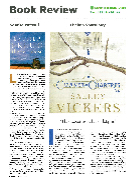Book Review Sandra Metcalf ily is working on a college assignment Labout the architect Klaus Lehmann and rents a cottage in the village of Steersborough where 50 years before Lehmann had built a house for himself and his wife Elsa. Forced to leave Germany during the 1930's, and leading the peripatetic life which goes with architectural commissions, the need to re-establish himself in another country and the exigencies of a world war, Klaus had spent a lot of time away from Elsa. Lily has been able to acquire the letters Klaus wrote constantly to Elsa, telling her about the places he stayed and the work he was doing but also, she finds, pouring out the life-long passion he felt for her. Which makes Lily begin to reflect on her own reasons for training as an architect and her relationship with her workaholic partner Nick. Alternating with Lily's present day research and growing understanding of the Lehmanns is another story. Max Meyer met the couple in 1953, when he visited Steersborough and painted many of the buildings in the village. Max had begun to train as an artist in Germany in the 1930's but had been sent by his parents to London and had been interned during WWII. These events , plus the isolation caused by his deafness, have traumatised him. But his return to painting and the attraction he feels toward Elsa Lehmann enable him to at last put the past behind him and to make decisions about his future. The interlinking narratives involve many characters from the village and from elsewhere, some of them sympathetic and some of them not, and relate several of their apparently disparate stories - which are in fact linked up at the end of the novel. Lots of things happen but few of them are overtly dramatic (rather like life really!) incident, contingency and coincidence move the narrative along and woven through it are themes of love , memory , art and the meaning of home, and perhaps the thing that leaves the strongest impression behind - Freud's evocation of the wide skies and empty landscape of the Suffolk coast, its intense light and unpredictable weather , and the effect they has on the imagination . VICKERS 'This latest novel is a delight.' 8 Phonebox Magazine t was many years since Agnes Morel had first arrived in Chartres, spending the first night huddled in a convenient niche in the North Porch of the cathedral. During that time she had made herself useful in a variety of ways, from babysitting to ironing , to darning Professor Jones' clothes after his wardrobe had suffered a bad attack of moth. But it was as she weeded the flowerbeds in front of the cathedral that Abbe Paul stopped to chat, told her that the cleaner had found the work too hard and heard her gentle response, 'I will clean it if you like'. We soon learn that Agnes was a foundling, discovered wrapped in a tablecloth in a basket by a farmer in Evreux. Since it was St Agnes day, he gave her the saint's name, and since he enjoyed morel mushrooms , that became her surname. After a search for her mother proved fruitless , she was brought up by the local nuns, until , working in the orchard and vegetable garden accompanied by a young local boy, her troubles began. Moving backwards and forwards Agnes' life, the author gradually fleshes out her character , not chronologically, but providing information by a series of flashbacks, while placing her main character in the cathedral , interacting with those who work there or visit. They are varied, some kind, some less so, some wanting to help Agnes, others finding fault. And so the novel develops with the cathedral of Chartres as its backdrop , the beauty and spirituality of the ancient building permeating the lives of those connected to it. Those who have read ' Miss Garnet 's Angel ' will recognize the gentle, mystical quality with which Salley Vickers imbues her writing. In each of them the reader is presented with a main character who is essentially solitary and yet seeking for companionship, who has a past which gradually is revealed and with whom we are encouraged to feel an affinity. This latest novel is a delight. eOxfam Bookshop, Olney Tel: 01234 714592 Thelma Shacklady through
